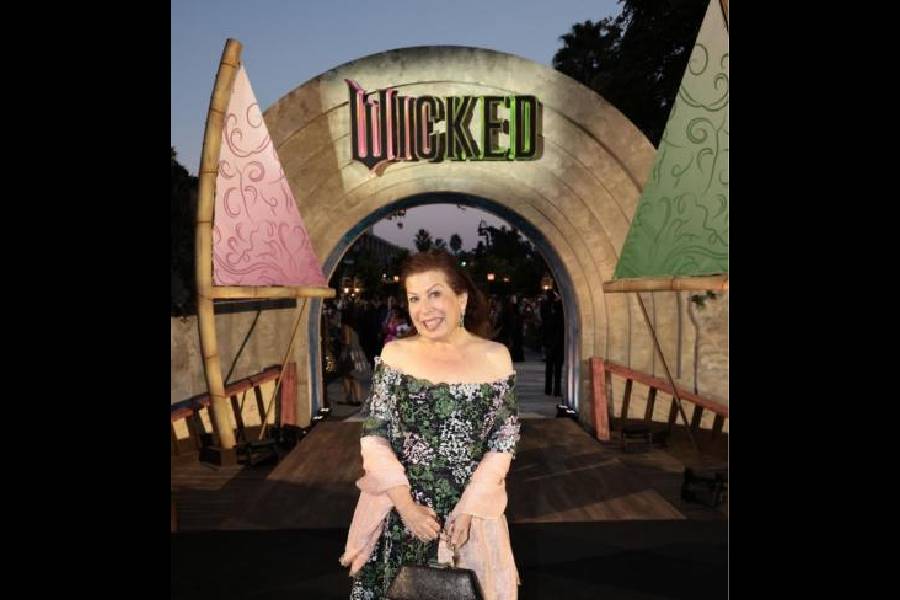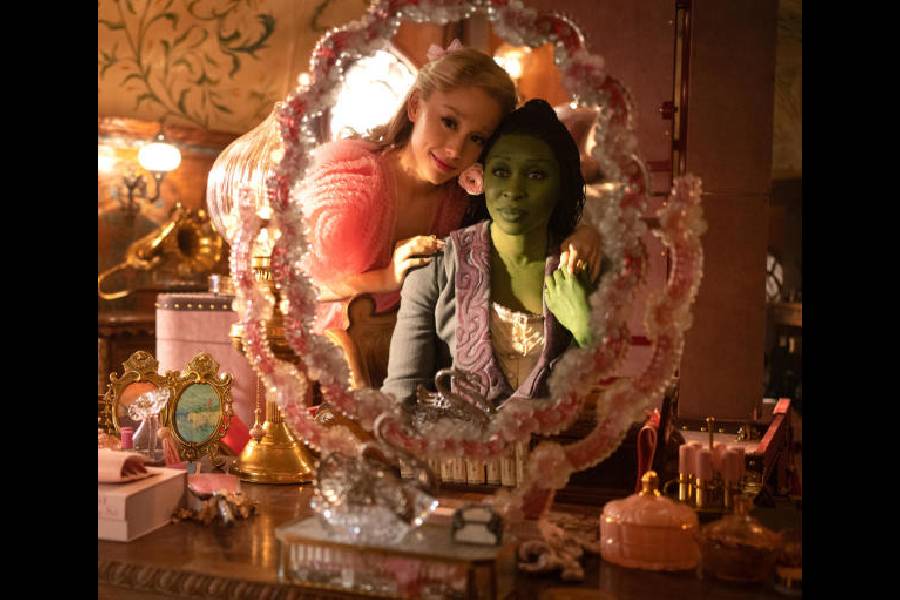It has been watched by over 67 million people worldwide. It is the winner of over 100 major awards, including a Grammy, Tony and Olivier. After its blistering run on stage, Wicked the musical makes its way to the big screen this Friday.
A loose adaptation of the 1995 Gregory Maguire novel Wicked: The Life and Times of the Wicked Witch of the West, which in turn is based on L. Frank Baum’s 1900 novel The Wonderful Wizard of Oz and its 1939 film adaptation, the musical is told from the perspective of two witches, Elphaba and Galinda, before and after Dorothy’s arrival in Oz. The story explores the complex friendship between Elphaba (who becomes the Wicked Witch of the West) and Galinda (who becomes Glinda the Good). Before it hits screens on November 22 (with a second film arriving next year), t2 chatted over a video call with Winnie Holzman (writer) and Stephen Schwartz (composer and lyricist) who, along with director Jon M. Chu, have been integral to Wicked’s journey from stage to screen.
What was your reaction when you heard that Wicked was going to transition from stage to big screen in not just one but two films? I know that the two of you have often talked about the possibility of that happening sooner or later...
Winnie Holzman: We kind of knew it would be a film, but initially, we didn’t know it would be two films. In the beginning, it would be fun for us to contemplate and have conversations, as you said, like: ‘What do you think the film will be like? Maybe this should be in it.’ Both of us always had moments in the stage show where we felt if only we could expand on this a little or could explore this a little more... or even things that you don’t see on stage, if only we could show them more, even if a little.
This (the film) was our opportunity. It was exciting but we took our time... we weren’t in a rush. We were both doing other things.
Stephen Schwartz: We didn’t want to release the movie too early. As we were developing it and doing what we couldn’t do on stage, we began to realise that we needed a lot more time. We kept trying to compress and leave things out in order to make it one movie. But we were frustrated because we felt we weren’t able to explore it fully enough. So when the decision was made to make two movies, it gave us great freedom to do what we wanted to do with the story. Our director Jon Chu brought in his ideas and it was exciting and liberating to make this into two movies.
Winnie: That gave us room to explore. We didn’t have to keep thinking: ‘How can we compress this?’ We had a much freer range to tell the story we wanted to tell.
What kind of out-of-the-box thinking and effort did it take to adapt this to screen?
Winnie: For me, writing is a challenge. I have never written anything where I went: ‘Oh, this is so easy and I am so relaxed’ (smiles). Even with Wicked, I never felt like I had already written this (for stage). I felt like I was writing something new because I was doing it in a new way at a new time with new ideas.
I wanted to leave no stone unturned. I didn’t want to look back later and think: ‘Why didn’t I explore this idea?’ I wanted to be true to myself in terms of all the things that I thought of trying. I tried a whole lot of stuff that at times even veered away from the blueprint, which is our show. But in the end, it gave me a feeling of confidence when Jon Chu would say to me: ‘Let’s just do it the way you do it in the show.’

Obviously, there are things in both movies that are very different from how we do it in the show. I loved this feeling of letting myself and my imagination loose and opening my mind to new possibilities. That is always a little scary, but it is a good feeling too. It is very creative.
Stephen: For me, a big challenge was how to translate some songs that are basically theatre songs and to make them work on film. On stage, you can put your lead actress in the middle, hit her with three spotlights and she sings for three-and-a-half minutes without moving. And it is one of the most exciting things in the show. But you can’t do that in a movie!
In a song like Defying Gravity, where she (Elphaba, played by Cynthia Erivo in the film) is flying, that is naturally going to be cinematic and you are going to be able to do things more fully and excitingly, perhaps, than you can do on stage. But a song like The Wizard and I or I’m Not That Girl, which essentially she stands still and sings on stage... how do you realise that on film?! That was challenging.
Fortunately, we had a very skilled director who came up with concepts that allowed him to realise those songs successfully on screen without seeming like he desperately did things because it was a movie. It has been exciting for me to see the songs that I thought were going to be difficult to translate on screen be successful in how Jon realised them.
Why was it important for you to have live singing on set? In the film, you had the liberty to record them...
Stephen: What was important was to have actual singers, to have actresses and actors who could perform this live, if they needed to. I am always frustrated by musical movies which cast people who can’t sing very well. And then they trick them up a little bit by tuning them in the studio to make it seem like they can sing better than they actually can.
In Wicked, we had two world-class voices in the form of Cynthia (Erivo as Elphaba) and Ariana (Grande, who plays Galinda/ Glinda). So if there was a scene in the film where they weren’t flying around on a broom or whatever, they could sing live. That gives the performance so much more immediacy. We were able to do a composite of pre-recorded vocal and a lot of live vocal to try and have as intimate, emotional and immediate a performance as we could.
Winnie: The artistes themselves were determined to sing live a lot because that is who they are.
Stephen: When you lip-sync, no matter how much it is your own performance, you have studied it and worked it out, it is still going to be a bit of a facsimile. That is what was so good about having such great singers... that they could sing live, and sing well at the same time.
Winnie: Their incredible abilities (as singers) is a big part of their identity as artistes. So it would be very strange for them at times to be lip-syncing.
Stephen: That we were able to do so much live recording and put it together in a way where we can’t tell if a line is live or from a pre-record, is very satisfying.
What is it about the fantasy genre in general and Wicked in particular that makes it appealing across demographic, geographical boundaries, age groups, and generations?
Winnie: It is the story of two young women stepping into their power, stepping into their own destinies, refusing in a way to accept lies and standing up for the truth. They are determined to become all that they are meant to be. That message really resonates, and not just with young women. Also, our story is one of friendship...
Stephen: It is also a love story...
Winnie: Exactly. There are so many different kinds of love that can affect and change one’s life. This is the story of the depth of a friendship and the friendship changes the two (Elphaba and Glinda) for the good.
Stephen: Elphaba, because she is green, feels herself to be an outcast and her desperate desire to be loved and to be accepted, and then coming to realise that there is a certain cost to it that is not worth the cost of integrity, also resonates. That is an inspiring story.
A lot of people feel different or feel outside and wish they could be more inside, if you will, but what will it cost them? One of our producers of the show, David Stone, has always summed it up with: ‘We all have that green girl inside us.’ I think that has made the show speak to all demographic, not just young women.
Winnie: The show has its heart on its sleeve...
Stephen: It has real emotions and it is not ashamed of them.
Winnie: It almost gives you permission to have some feelings. In our world, we can feel very cut off from each other, feel very numbed out... there is a lot coming at us and it is sort of deadening at times. And I think something that opens you up to genuine, authentic emotion that allows you to feel, and feel connected, is welcome.











